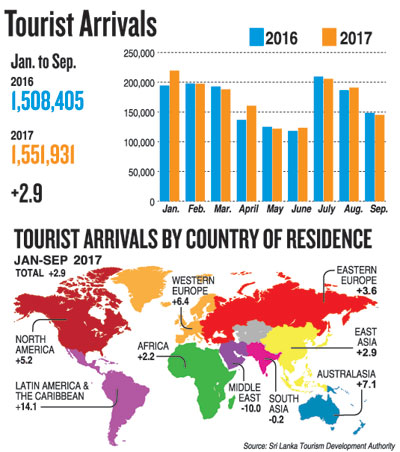Crisis in Lankan hotels likely to worsen in winter season
View(s):Employees in Sri Lanka’s crisis-hit hotel industry are threatening union action during the upcoming winter season if their decades-long demands are not met in the upcoming budget 2018.
One of the concerns is reduced service charge payments with hotels reducing service charges by at least 40 per cent to workers due to low occupancies.
The employees have thrown a challenge to their employers, some of the best Sri Lankan hotels, to ensure that at least 50 per cent of service charge payments and their basic salary be calculated into the EPF and ETF contributions, Hotel Workers Centre – Inter Company Employees Union National Convenor D.I. Abdeen told the Business Times on Tuesday.
Hotel workers at the time of employment are offered the minimum basic salary of Rs.13, 500 by indicating to them that the fancy service charges earnings were a bigger attraction to join the industry.
In this respect, Mr. Abdeen explained that if the industry views the service charge payments made to its employees as earnings then the union is requesting that at least 50 per cent of these earnings be added as a separate entity but included in the calculations of the EPF and ETF payments to workers. The union has written to the Finance Minister Mangala Samaraweera on October 19 to include their proposals in the November 9 budget.
Mr. Abdeen pointed out that at a time when even the apparel industry was paying their workers a minimum basic salary of Rs.20,000, the minimum basic salary offered to them was a paltry amount that upon retirement proved futile in terms of EPF and ETF payments accumulated by then.
He said that although this request had been made over the past 14 years they had not obtained any remedy.
Should their request not be included in the budget, proposals, the hotel workers said they would initiate union action in line with the upcoming winter season by way of demonstration, poster campaign or a countrywide token strike.
He explained that of the 37 Wages Board salary structures, hotel workers were paid the lowest salaries.
Workers have held discussions with Tourism Minister John Amaratunga and even previous Ministers starting with Milinda Moragoda and since no positive response was forthcoming they have put forward their request to the new Finance Minister.
Mr. Abdeen pointed out that they have had discussions with the Hoteliers Association officials and that even some of them were in agreement with their position but no action was taken by them.
The union said that hotels are also facing a grave crisis with some even claiming that hotel prices today were much lower than what was offered even during the war period.
This has contributed to workers being taken to task on this as the hotels have found it difficult to make service charge payments of 10 per cent.
Moreover, it was highlighted that the skilled workforce were opting to leave for higher wages to West Asia as a result of which about 15,000 from the hotel sector were said to find jobs overseas annually.
Bringing out some of the other concerns that have caused a pinch on their pay, the workers insist that adequate regulation was not carried out, as a result of which the informal sector was expanding with homes-stays opening up from Hambantota to Kollupitiya resulting in low hotel room occupancies.
The existing hotels especially in Colombo were tipped to face challenges from the upcoming new hotels and even though some had carried out renovation work the service charges continued to fall, it was pointed.
Mr. Abdeen said that they request the government to at least carry out the much needed promotions in a bid to attract visitors to the country.

| Room rates lower than war period | |
| Hoteliers have sold rooms at very low rates due to a lack of demand, some prices even lower than room rates fetched in Sri Lanka during the war period.With the influx of Indian and Chinese tourists to the country it has been found that most were staying in the informal sector which accounts for 40 to 50 per cent of the inbound traffic. Industry analysts said that positioning the country was imperative to attract the right, upmarket travellers to the destination. A lack of marketing and the dengue outbreak have seen a dip in arrivals. But expectations are high on achieving the targets due to the possibility of cashing in on the numbers tipped to come in November and December. |
| Colombo seals minimum rates for hotels | |
| Minimum rates for Colombo city hotels are likely to stay even after protests by certain sectors of the industry wanting to see an end to it. And, from next year officials will strictly enforce effective penalties for those found violating rates in the city.It is believed that the minimum rates on hotels needs to stay since the city hotels would be challenged with competition intensifying – with the January 2017 entry of new properties like Movenpick Colombo and the November 17, 2017 opening of Shangri-La Colombo. Moreover, the industry’s new investors were likely to have made their cost calculations based on these minimum rates as a result of which officials believe that it would not be fair to remove it and surprise these new hotels. In future, the industry would be eyeing the possibility of positioning itself on the likes of other destinations like Seychelles, Mauritius and Malaysia and thereby take up the challenge of competing against them. |


